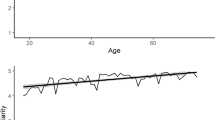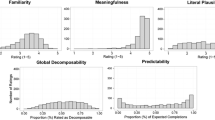Abstract
Four experiments will performed to examine how familiar idioms are interpreted. Subjects had to respond as rapidly as possible whether an idiom had the same or different meaning as a phrase which, on half of the trials, was a paraphrase of either the figurative or literal meaning of the idiom. When subjects were instructed to respond on the basis of either figurative or literal meaning, idioms were matched to their literal and figurative paraphrases equally rapidly. When subjects were instructed to respond only on the basis of literal meaning, idiom-phrase pairs that shared a figurative interpretation took longer to reject as different than idiom pairs that shared no interpretation. These results domonstrated that whenever a familiar idiom is comprehended, both its literal and figurative interpretations are made.
Similar content being viewed by others
References
Bock, J. K., & Brewer, W. F. Comprehension and memory of the literal and figurative meaning of proverbs.Journal of Psycholinguistic Research, 1980,9, 59–72.
Clark, H. H. The language-as-fixed-effect fallacy: A critique of language statistics in psychological research.Journal of Verbal Learning and Verbal Behavior, 1973,12, 335–359.
Eddy, J. K., & Glass, A. L. Reading and listening to high and low imagery sentences.Journal of Verbal Learning and Verbal Behavior, 1981,20, 333–345.
Fraser, B.The verb-particle combination in English. Tokyo: Taishukan, 1974.
Heringer, J. Idioms and lexicalization in English. In J. P. Kimball (Ed.),Syntax and semantics: The grammar of causative constructions (Vol. 9). New York: Academic Press, 1976.
McCloskey, M. The stimulus familiarity problem in semantic memory research.Journal of Verbal Learning and Verbal Behavior, 1980,19, 485–502.
Newmeyer, F. The insertion of idioms. InPapers from the Eighth Regional Meeting. Chicago: Chicago Linguistic Society, 1972.
Swinney, D. A., & Cutler, A. The access and processing of idiomatic expressions.Journal of Verbal Learning and Verbal Behavior, 1979,18, 523–534.
Weinreich, U. Problems in the analysis of idioms. In J. Puhvel (Ed.),Proceedings of the Summer 1966 Linguistics Forum at UCLA. Berkeley: University of California Press, 1967.
Author information
Authors and Affiliations
Additional information
This research was supported by the National Institute of Mental Health Grant RO3 MH29398 to Arnold L. Glass.
Rights and permissions
About this article
Cite this article
Glass, A.L. The comprehension of idioms. J Psycholinguist Res 12, 429–442 (1983). https://doi.org/10.1007/BF01067624
Accepted:
Issue Date:
DOI: https://doi.org/10.1007/BF01067624




